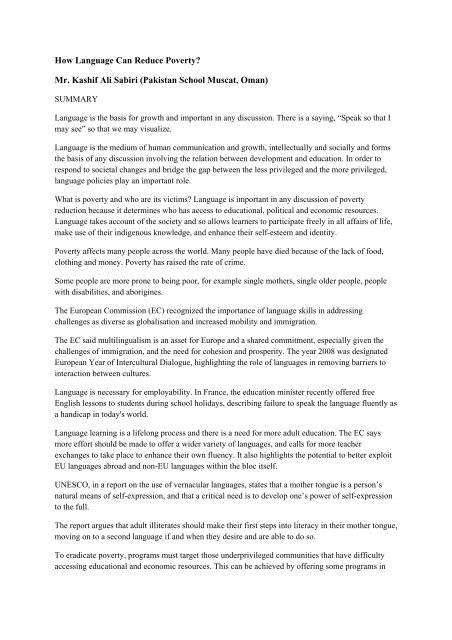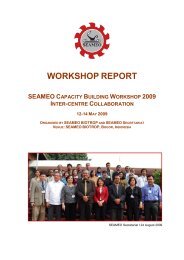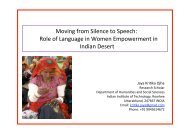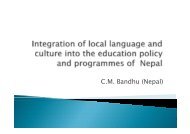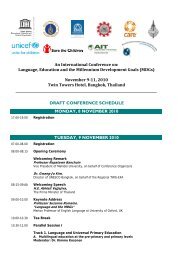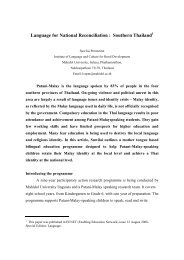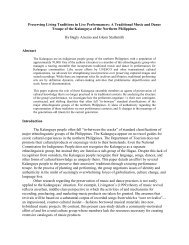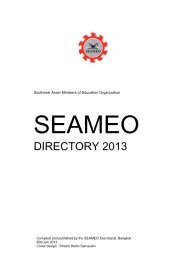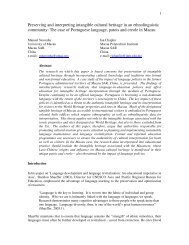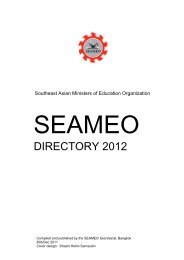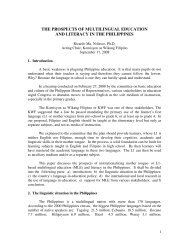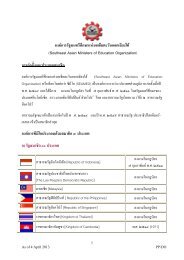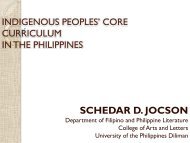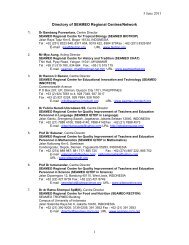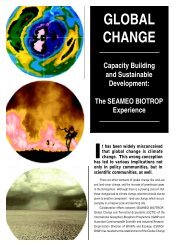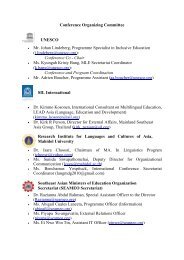How Language Can Reduce Poverty? Mr. Kashif Ali ... - SEAMEO
How Language Can Reduce Poverty? Mr. Kashif Ali ... - SEAMEO
How Language Can Reduce Poverty? Mr. Kashif Ali ... - SEAMEO
Create successful ePaper yourself
Turn your PDF publications into a flip-book with our unique Google optimized e-Paper software.
<strong>How</strong> <strong>Language</strong> <strong>Can</strong> <strong>Reduce</strong> <strong>Poverty</strong>?<br />
<strong>Mr</strong>. <strong>Kashif</strong> <strong>Ali</strong> Sabiri (Pakistan School Muscat, Oman)<br />
SUMMARY<br />
<strong>Language</strong> is the basis for growth and important in any discussion. There is a saying, “Speak so that I<br />
may see” so that we may visualize.<br />
<strong>Language</strong> is the medium of human communication and growth, intellectually and socially and forms<br />
the basis of any discussion involving the relation between development and education. In order to<br />
respond to societal changes and bridge the gap between the less privileged and the more privileged,<br />
language policies play an important role.<br />
What is poverty and who are its victims? <strong>Language</strong> is important in any discussion of poverty<br />
reduction because it determines who has access to educational, political and economic resources.<br />
<strong>Language</strong> takes account of the society and so allows learners to participate freely in all affairs of life,<br />
make use of their indigenous knowledge, and enhance their self-esteem and identity.<br />
<strong>Poverty</strong> affects many people across the world. Many people have died because of the lack of food,<br />
clothing and money. <strong>Poverty</strong> has raised the rate of crime.<br />
Some people are more prone to being poor, for example single mothers, single older people, people<br />
with disabilities, and aborigines.<br />
The European Commission (EC) recognized the importance of language skills in addressing<br />
challenges as diverse as globalisation and increased mobility and immigration.<br />
The EC said multilingualism is an asset for Europe and a shared commitment, especially given the<br />
challenges of immigration, and the need for cohesion and prosperity. The year 2008 was designated<br />
European Year of Intercultural Dialogue, highlighting the role of languages in removing barriers to<br />
interaction between cultures.<br />
<strong>Language</strong> is necessary for employability. In France, the education minister recently offered free<br />
English lessons to students during school holidays, describing failure to speak the language fluently as<br />
a handicap in today's world.<br />
<strong>Language</strong> learning is a lifelong process and there is a need for more adult education. The EC says<br />
more effort should be made to offer a wider variety of languages, and calls for more teacher<br />
exchanges to take place to enhance their own fluency. It also highlights the potential to better exploit<br />
EU languages abroad and non-EU languages within the bloc itself.<br />
UNESCO, in a report on the use of vernacular languages, states that a mother tongue is a person’s<br />
natural means of self-expression, and that a critical need is to develop one’s power of self-expression<br />
to the full.<br />
The report argues that adult illiterates should make their first steps into literacy in their mother tongue,<br />
moving on to a second language if and when they desire and are able to do so.<br />
To eradicate poverty, programs must target those underprivileged communities that have difficulty<br />
accessing educational and economic resources. This can be achieved by offering some programs in
minority languages, as well as by having an adequate and varied supply of reading material in the<br />
same.<br />
The role of language in the adult education system reduces poverty because it removes language<br />
barriers and enables more people to benefit from available education and information networks.<br />
<strong>Language</strong> is an embodiment of a community’s knowledge, wisdom and experience and its exclusion<br />
results in their loss.<br />
With the acceptance of English as the dominant international language, scholars fear that our<br />
collective cultures will be edited and summarized according to criteria of relevance by the wealthy,<br />
dominant cultures.<br />
I would like to make a personal request. Let’s join hands in eradicating poverty using the sharp-edged<br />
axe of language and learning.<br />
DISCUSSION<br />
Q – Our basic goal is to reduce poverty. <strong>How</strong> can we really achieve the MDGs by 2015? The most<br />
basic thing is education. Remove education and there is no progress. If language is central to all our<br />
activities we need to find out how many languages there are. There are 110 languages in the<br />
Philippines. What language will we use to be understood in one place?<br />
<strong>Kashif</strong> <strong>Ali</strong> Sabiri A – We need to look at the material to use on the problem. <strong>Language</strong> can overcome<br />
issues in the world. Money, books, everything depends on language. So people need to use one<br />
language (mother tongue) and the national language.<br />
Right from primary school, there should be one language in one country. In my country it is English.<br />
It is easier to learn in English. There should be no limit on adopting a language.<br />
It is more feasible to spend money on one language rather than money on local languages.<br />
We are becoming a global village. We are citizens of one planet but we promote 6,900 languages.<br />
There needs to be a language change. I just share this idea.<br />
We need to follow developed countries, but not necessarily copy them.


